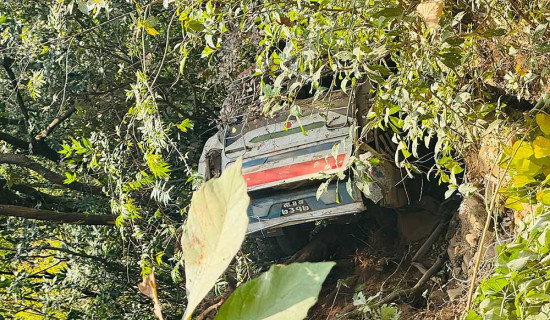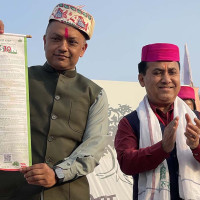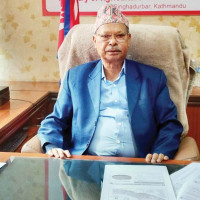- Thursday, 19 February 2026
Live Up To The Promise
If someone asks a question about how a nation can be built, there might be several responses – some would proclaim that democracy can build a nation, while others would retort that socialism can guarantee this. Still, others would argue that democratic socialism is the most effective system for achieving this. There are other variations to these systems, such as new democracy, people’s multiparty democracy, and a host of others. Within these broad categories, we often mention nationalism, good governance, rule of law, zero tolerance for corruption, economic growth, and social transformation, among others. These terms are so popular that if a political group does not include them in its political agenda, it will surely fall out of the political scene.
However, if someone says things that are not intended to be put into action, they are merely rhetoric. A rhetoric, previously meant as an art of speaking, has now turned out to be an art of lying. In many nations, it has lost its positive connotation and is being used as a derogatory term. In a pejorative sense, rhetoric is a lie. Ironically, the more lies one tells, the more successful they can become.
Credibility
Nepal is a country that belongs to the category of nations where some political actors have lost their credibility due to repeated rhetoric that is meant to be said but not done. While people vote for their leaders every election, hoping to achieve more than they have, they often get nothing compared to the leaders’ promises. To cater to the general people’s expectations, not to this or that individual, the entire nation has been built so that all its citizens can benefit collectively. This country has struggled to be built for a long time; substantial success has not yet been achieved in any attempt by any government, even after the advent of democracy. Wherein lies the crux of the problem?
Every leader of each political group delivers lofty promises to the people, promising various things that will help the nation prosper. However, many times, their promises have not been kept in the true sense. This is mainly because they promise things that are never achievable. If someone promises unachievable goals, then they become mere rhetoric. Political rhetoric in Nepal is thus often viewed as a mere lie, as political actors are considered to be those who promise things but fail to deliver on those promises. This is a more than shameful situation for a nation that needs to be built in an absolute sense and has to be built faster than ever.
The Nepali media is replete with reports of recent agitation that surfaced in the death of innocent youths and the destruction of public and private property on an unprecedented scale. The reports claim that the angry reactions of youths were against the cabinet members from the erstwhile government, who were vehemently criticised for being deaf to the people’s genuine concerns and accused of involvement in corruption scandals. These allegations may prove to be true or false after the investigation, and if proven true, they will also be found to be the genuine cause of the agitation. If not proven as expected, on the contrary, the martyrdom of more than six dozen Nepali people will not be justified.
In addition to the above-mentioned explicit reasons for the youth uprising, there is an implicit reason for the repeated agitations and inconclusive solutions: the mere rhetoric of political actors. This is by no means a less important cause of the apparently unending instability in the Nepali governance system. In retrospect, we need to seriously consider the two epoch-making political events that have shaped the politics of our country. We have witnessed that leaders of the anti-Panchayat movement of 1990, guided by the euphoria of achieving their goal of establishing a multiparty democratic system, promised to foster democracy and socialism.
However, the then democratically elected government soon failed to keep its promises, mainly because its promises were unachievable. Likewise, Janandolan II of 2006 promised to dismantle the conventional feudal system still rooted in an accidentally restored monarchy and bring complete equality among the people of different classes, genders, and ethnicities. If those promises had been fulfilled, people would have had everything they needed for prosperity; Nepal would have been a heavenly paradise.
However, after more than three decades under the democratic system, our leaders have repeatedly failed to deliver the promises. The primary reason for this is the leaders' tendency to overpromise, resulting in unachievable commitments. The executive leaders of each party were involved in the practice of upmanship, trying to appear superior to others by saying things that were better, bigger, or more impressive than those of others. This upmanship was almost like trying to put an elephant into a small handbag. It was not the fault of the people that they aspired to what the leaders had promised. Hence, agitations followed one after another.
Timely measures
What should be done then? Obviously, we need to do two things simultaneously to rectify the present seemingly incorrigible situation. First, while political actors prepare for the next election, they should forge a consensus to end the follies and foibles contained in upmanship by seriously evaluating their past actions and putting forward their agenda on realistic grounds. Second, people should fearlessly choose competent and honest candidates in the next election who are capable of delivering on their promises and guided entirely by their ethical sense of public interest, devoid of even an inch of self-interest, both in mind and heart. These are axiomatic truths that require no further evidence. Time dictates that this should happen without wasting a single minute.
If our leaders understand the need of the day and prepare their political agenda accordingly, and if citizens vote fearlessly for only capable and honest candidates to form an accountable government, even within the limitations of the existing system, then we may not have to wait long to see a luminous light on the horizon.
(The author is the chairman of Molung Foundation. bhupadhamala@gmail.com)









-original-thumb.jpg)






